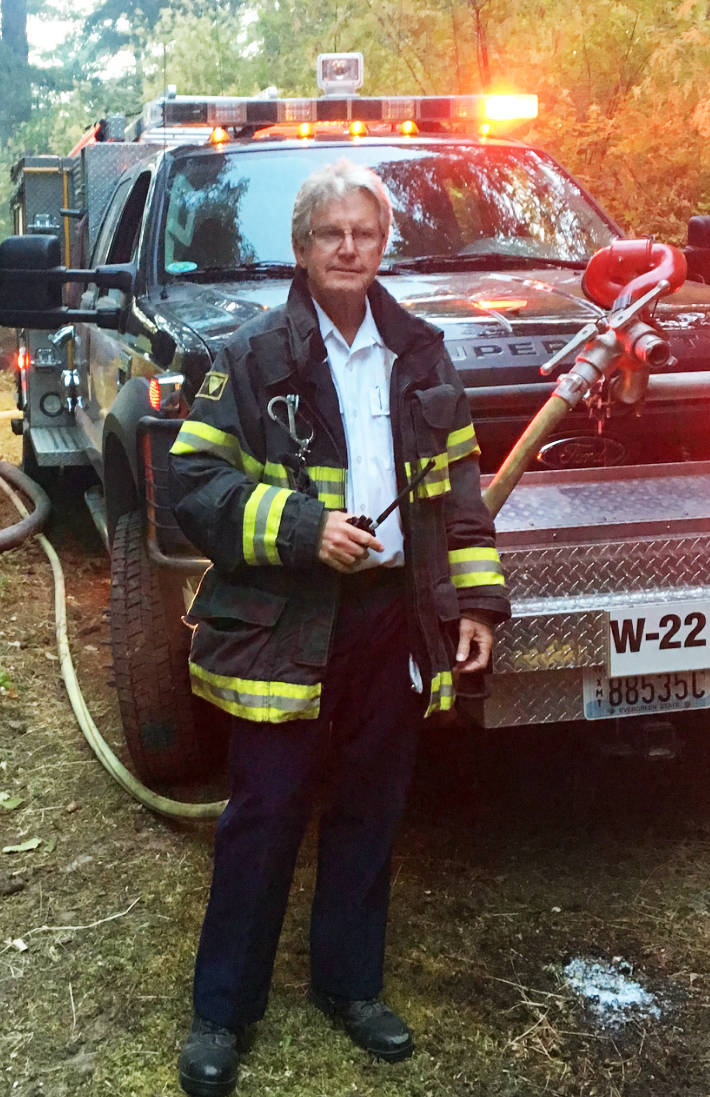Many of us, when we contemplate retirement or the next chapter of our lives, often look back on the pivotal moments that shaped our future, spaces in time that provided direction or a path to our future selves. For some, it’s gradual, a maturation, a growing into something. For others, like recently retired Patrick Shepler, it was a moment, a transcendent moment that defied logic.
For Orcas Island Fire and Rescue’s former battalion chief, it was a vision.
In the mid-1970s, Shepler was two years into a four-year undergraduate biology degree. His hope, his plan, was medical school.
One Iowa winter morning while killing time between classes, Shepler was looking out the windows from the university’s second-story cafeteria. The windows were heavy with condensation, he recalled. Shepler stopped the story to offer context.
“The thing about that university (Maharishi International University),” he explained, “was the fact that neither drugs nor alcohol were tolerated. At all. I say that only because I want to dispel any idea that drugs were involved in what I saw. They were not. I had a vision. An out-of-body-like experience and saw what I wanted to become.”
Somewhere between the glass and the snow on the ground, Shepler saw part of an image of himself riding in a fire and rescue truck. He knew immediately that’s what he wanted to do.
“Never before or since have I ever experienced anything quite like that,” he said.
Shepler explained that he’d often seen himself as a football of circumstances, finding himself getting kicked into the right place at the right time.
“This was not that,” he said. “When I saw that [vision], it was a direction I knew I needed to follow; it was what I wanted to do.”
Curiously, Shepler wasn’t even sure what “that” was. He just knew it was to be his purpose.
“Ironically, six months prior to the vision, my dad drove out to visit me from southern California. While he was there he experienced chest pains, which I did not recognize as being such a big deal, and he drove himself straight back to Los Angeles,” Shepler said. “Fortunately, my dad’s cardiologist was the famous Dr. Walter Graft who championed the L.A. County Paramedics program and whose name is emblazoned on the UCLA School of Paramedicine.”
Born and raised in Compton, California, Shepler’s path to being a top-notch paramedic and a staunch advocate for the program has been a steady and synchronistic progression. After graduating from high school, he pursued an education with a focus on medical care. His biology studies in Iowa morphed into a pursuit of emergency service education, and the emerging role of paramedics as an enhancement to a fire department’s EMT team.
Shepler started his professional career in 1979 as a volunteer firefighter EMT in South Pasadena, Florida, a small community outside of St. Petersburg. Once he completed his paramedic training, he worked as a firefighter/paramedic for the City of Clearwater, as a flight/paramedic, and taught EMT and paramedic classes for St. Petersburg College. In 2003, after retiring from the Clearwater Fire Department, he went to work full-time as the EMT curriculum development and marketing director for St. Pete College that served 18 fire departments in Pinellas County, Florida, once of the state’s most densely populated counties.
Then, in 2005 through “sheer coincidence, fate or whatever,” Shepler vacationed on Orcas which, he says with a sly grin, he found “interesting.” Back in Florida, he wondered if that crazy island ever hired firefighters.
“In an email, I asked if they were interested in fire paramedics with a strong educational background.
The response was immediate: “‘You’re exactly what we’re looking for,’ they replied,” said Shepler.
“Patrick was born into this profession,” offered Dr. Michael Sullivan, Orcas Island Fire and Rescue’s former Medical Director, who hired Shepler in 2005. Sullivan, who served as medical director until early 2020, complimented Shepler on his contributions to the island.
“He has saved so many lives,” Sullivan said, “and consistently shown support for the island’s fire department and their mission. His contributions to the training of first responders have had an enormous impact on our delivery of emergency services.”
He also lauded Shepler for his “Stop the Bleed” training program, and hopes the retired battalion chief continues to volunteer his services to local fire and rescue efforts.
“When someone is as dedicated and committed to this work as Patrick, it’s hard to turn it completely off,” Sullivan said.
In fact, Shepler also hopes to be able to continue serving the Orcas community. While he will occasionally spend time in Florida where he and his partner, Kathy Godard, maintain a home, Shepler hopes to help out on the island whenever he’s here.
Islanders hope so, too. Carol Owens is one of them.
“I would let that man remove my appendix,” she laughs. “I trust him that much. He saved my life and the life of my husband several times. His quiet nature, wry sense of humor and sparkling eyes have meant so much to me over the years. We have developed a truly close relationship. I hope he hangs around.”
It’s a sentiment echoed by many grateful islanders.




